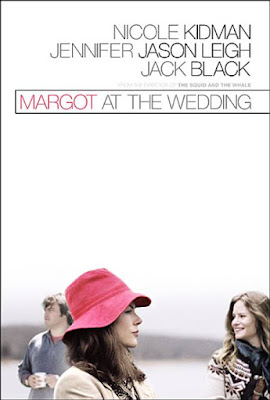
Someday, someone will have to explain to me how a movie like Margot at the Wedding gets totally overlooked by the Oscars, while something like Juno wins Best Screenplay. Not to take anything away from Juno...it's a perfectly cute little movie with a perfectly cute little script. But it's not a real piece of writing - it's a trite story festooned with slang and pop culture references. In ten years it will look horribly dated. Meanwhile, the films of Noah Baumbach will probably have grown in stature. Certainly, The Squid and the Whale, which I adored, and Margot at the Wedding, which I liked a lot, will have long-since surpassed flavor-of-the-month efforts like Diablo's teeny-weeny preggo-teeny flick by then.
Margot at the Wedding isn't even really a comedy, but I laughed more watching it than I did at Juno. I laughed for the same reason I laughed at The Squid and the Whale - because it's all so true. Baumbach has such a wonderfully keen feel for family life that it's almost eerie. The adolescent tribulations of Walt in Squid and the Whale had me squirming - his pitifully doomed efforts at impressing his college professor father and author mom. And there's more of that in Margot at the Wedding: Zane Pais plays teenage Claude, the son of famous author Margot (Nicole Kidman) who is a certifiable nutcase. They journey to Margot's childhood home for the wedding of her younger sister Pauline (Jennifer Jason Leigh) and her wannabe-artist fiance Malcolm (Jack Black, laying the loser stuff on a little thick) - although there's a chance the only reason Margot came for the wedding is because the guy she's fucking happens to live a few miles away.
The family tensions Baumbach portrays are a thousand times more finely-rendered, believable and complex than the feel-good faux-conflicts of the Junos of the world. The best stuff is between Margot and Pauline: their relationship is such a love-hate tangle that even cutting the knot probably wouldn't do any good. There are intimations of childhood abuse, but Baumbach is smart and discreet enough to veer away from cause and focus on effect. Margot, of course, is the brilliant, super-neurotic one - she's convinced everyone in the world suffers from autism or Asperger's syndrome or some other disorder, but she just projects that onto people to make herself feel less screwed-up. Margot and Pauline's love grows out of their common childhood suffering but as adults they can't stand each other. You know Pauline feels smothered by Margot: her older, smarter sister's criticisms cause her to doubt all her decisions, including marrying Malcolm. What Baumbach gets so right is the sudden storminess of family relations, the way anger bubbles up, accusations are leveled and grievances aired, then a day later it's like nothing was ever said.
It works because Baumbach knows comedy and drama are not separate things; there's intense drama in the psychic conflict Baumbach renders, but also hilarious comedy. Baumbach has a talent for portraying the most humiliating situations without making you uncomfortable (unlike Todd Solondz who always seems to be mocking his characters). He gets that humiliation isn't only sad but funny too, and he never targets his characters or makes you feel like he's taking sides (not even when Malcolm becomes a complete blubbering mess). The tone is sort of delicate; Baumbach never sells it hard, nor does he bang you over the head with significance. He's reminiscent of Eric Rohmer in his sense of interplay but without the vague eroticism, and he doesn't distance himself quite as much as Rohmer. And he's terrific with actors. He gets the best performance I've seen Nicole Kidman give in ages (since The Others at least); it's a shame Nicole's face looks so fake now because it's distracting and doesn't seem to fit the character. And Jennifer Jason Leigh is outstanding as Pauline - she's got the usual JJL dirty hair and bad teeth thing going, and she makes a great, dish-raggy complement to Kidman's near-psychotic over-attuned quality and lashing resentment.
If I have any objection to Margot at the Wedding, it's that it may seem a little too slight at times, a little too content with its self-contained, semi-literary quality. The Squid and the Whale was equally controlled but seemed richer and possessed of a more varied personality. Squid was a novel, while Margot feels like a short story. But it's still a terrific read.